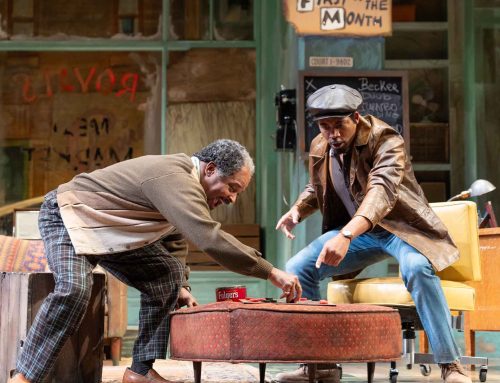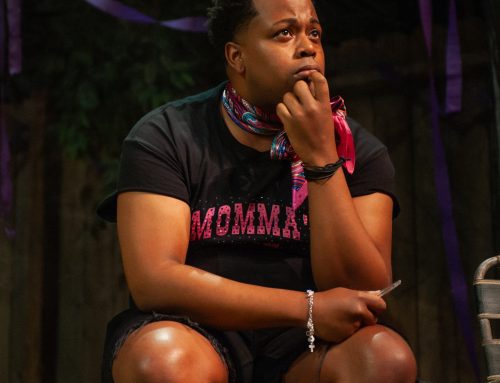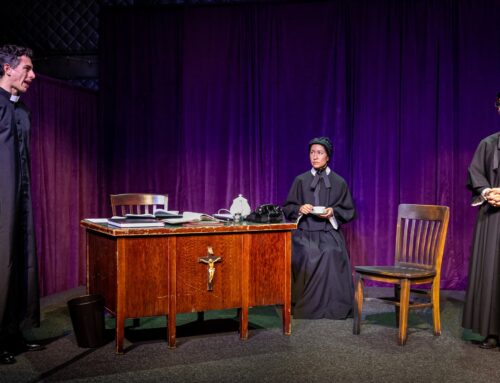at the Oregon Shakespeare Festival
Cat on a Hot Tin Roof
written by Tennessee Williams

Director Christopher Moore has blended the original 1955 script with some of the 1974 revisions penned by Tennessee Williams to give audiences a language-rich, clear, complicated, and very human account of the Politt clan in crisis.
Moore adeptly focuses on the different truths of the different characters, letting the audience explore “Whose truth is the truth?” The more explicit language and un-toned-down homosexual references in the theatrical versions (both 1955 and 1974) make the motivations of Brick (Danforth Comins), the central character, and his family deeper, more complicated, and more understandable than in the hushed-up Hays Code Taylor-Redford film.
The acting is tense in a low-key, realistic, and devastating way.
The first act is owned by Maggie (Stephanie Beatriz), Brick’s wife. Her dialog sets the scene, and her non-interaction with Brick sets the atmosphere. Maggie is all over the set, vibrant to the point of twitchiness. Brick is on stage, lying in a bed, through the act. He’s mostly mute, trying to get drunk enough for peacefulness to click on in his brain.
Maggie talks most of the act, changing moods and topics, attempting in vain to engage her husband. She’s young, aware, open-eyed, witty, and devoted. Beatriz packages Maggie’s up-from-the-poor, determined, ex-Southern debutante perfectly. She knows her mission, and she is up to the task.
Just as important as Maggie’s Act I dialog is the non-verbal communication of Brick. Ensconced in his bed listening to Maggie’s stories and entreaties, Comins is given only his face and body with which to tell his side of the truth. I found myself listening to Maggie while my eyes were glued on Brick. That split provided the full 5.1 mental surround-sound experience.
Williams’ words, Beatriz’s vitality and sharpness, and Comins’ ability to share pain and resignation created a one-act masterpiece. Beatriz’s casual removal and putting on of stockings also provided some of the most sensual sexiness on-stage moments I’ve seen.
Brick and Big Daddy’s (Michael Winters’) Act II emotional duel is a completely absorbing, clarifying interchange. Comins and Winters take their men to the edge of emotional intensity and then let Williams’ script dig still deeper and deeper. The revelation exchanges and challenges make complete, horrifying sense. No phony hysterics, no punches pulled.
I was unfamiliar with the stage story and its Big Daddy who was uncamouflagedly accepting of his son’s homosexual affair. I hadn’t known that as a young man Big Daddy was taken in by the gay couple who owned the plantation, and so I could not have wondered before what Big Daddy had done to become the favored employee who eventually took over the business. Had Brick and his brother Gooper (Rex Young) been teased by schoolmates about how Big Daddy’s came to his wealth? What is all this Southern homosexual stuff?? Hadn’t my generation invented public gay relationships?
But, I both digress and go beyond the script. The point is that Comins and Winters talked and revealed so intensely that my mind was left whirring and wondering about the possibilities. I was eavesdropping in on a once-in-a-lifetime conversation between unnaturally articulate and aware father and son. Their worries both resonated and estranged.
The final act displayed more angles of the truth from the lips of Gooper, his wife Mae (Kate Mulligan), and Big Mama (Catherine Coulson). Smaller roles, but no less intense, and no less intent on bending the rest of the world to their truth. In this production, Gooper and Mae are no cartoon foils but by-the-book toilers who expect that their upright hard work should both be rewarded financially and applauded for its moral superiority. I suspect that Gooper can come off as a cardboardish bad guy in other hands, but Young exudes inner strength and direction as he plays the dutiful son.
Mulligan, too, provides the moments of comic relief written for her Mae. But, she comes through with the necessary bitch moments where she, too, is protecting her version of family. She’s not a one-dimensional sister-in-law to the main character. Rather, she is a righteous woman making sure that her husband, children, and family get what is due them. Even with her public mendacity, she’s not played as pawn populating Brick’s world.
Coulson’s Big Mama is similarly clear and sincerely motivated. She may be wrapped up in what Brick would see as a world of lies. But, she acts only to further what she knows is important and in the only ways she knows how. At times Coulson minces and stumbles a bit much in an old-lady shuffle that borders on the distractedly slapstick, but ultimately she, too, creates a true person on stage.
The final scene with Brick and Maggie in bed is inevitable but done with a slowness and skill that truly ties together all the stories from the earlier acts. So much is possible, not possible, telegraphed, and felt in the last scene. After it I wanted to get away from the world to think about it, about them, about the whole family, about life.
In addition to Moore’s gnat’s-eyelash level of detail in direction, the production is helped greatly by Scenic Designer Christopher Acebo’s set. Its sky to earth curtains are a brilliant device, letting in light and sound, providing the illusion of privacy and separateness. Acebo’s vision gave the audience the same basic props each act, but showed them in differing angles each time the curtain opened. The room flipped, right became left, and even the thrust of the thrust stage switched its alignment. This sounds like a heavy-handed metaphor as I describe the conceit, but it works as an excellent complement to the different perspectives showcased in the script of the different acts.
Oregon Shakespeare Festival has taken the classic, complicated, ripe words of Tennessee Williams about a Southern, rich, and secretive family and transformed them. They no longer belong to literary history safely behind the glass of time, region, and class. OSF is offering a three-hour story about your family and mine, told simply and right on target.
Ozdachs Rating: ![]()





Leave A Comment